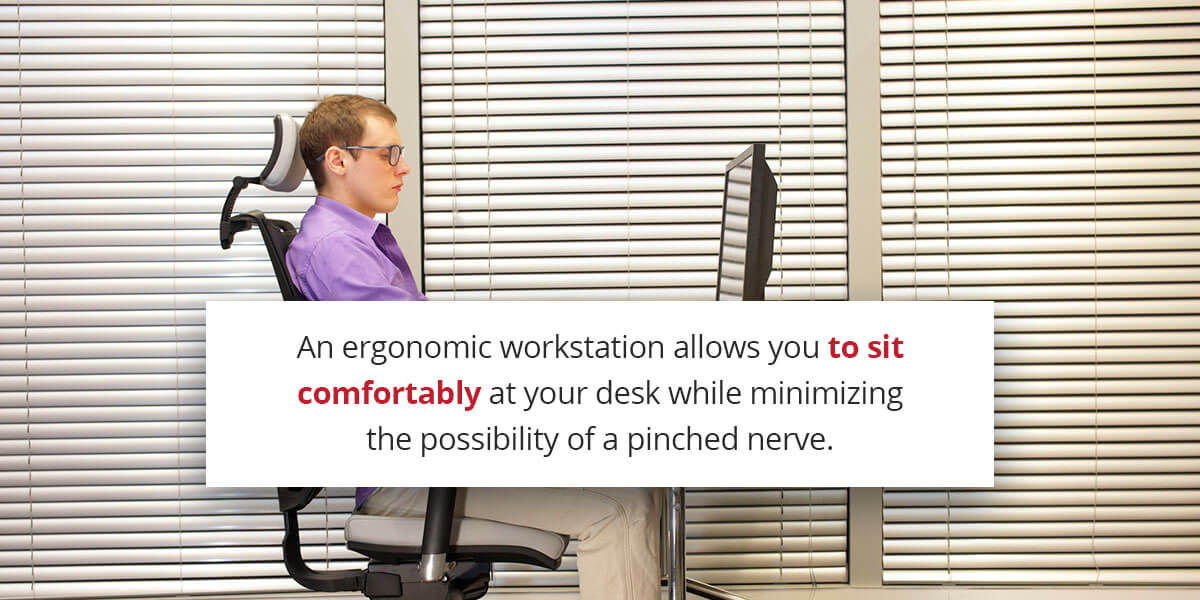A pinched nerve can come when you least expect it. Whether you recently sustained an injury or have had prolonged aches and numbness in a specific area of your body, a pinched nerve can limit your movement or cause a loss of sensation around your body parts. A pinched nerve impacts your nerve set as a result of constriction, compression or stretching of a physical area. Finding relief for this issue can happen at home or with the help of a professional chiropractor.
Symptoms of a Pinched Nerve
Pinched nerves can feel different for everyone. Some may experience numbness around the body or a painful sensation in one area. The most common symptoms of a pinched nerve that you might experience include:
- Constant tingling or pins and needles sensation
- Muscle weakness
- Feeling like your hand or foot is asleep
- Feeling numbness or losing sense in an area of your body
- Radiating pain, such as sciatica
- Aches and sharp pain
- Pain in the area of compressions, such as the neck or lower back
Causes of a Pinched Nerve
A pinched nerve can come as a surprise after an injury or appear as a chronic condition. You can experience this sensation from repetitive motions or sitting in the same position for too long. While these circumstances may seem unpredictable, you can easily recognize any habits you do throughout your daily routine that might cause a pinched nerve. Understanding the actions that can make a pinched nerve more likely allows you to slightly adjust your regular home and work habits to help prevent this pressure on your body!
Common causes of a pinched nerve are:
1. Sudden Injury
If you play sports, exercise, lift heavy objects or move too quickly, you might experience a pinched nerve in an area of the body. Twisting and pulling as you move can cause swelling or irritate the nerves. If you enjoy physical activity daily, you don’t have to stop exercising to avoid a pinched nerve! Before working up a sweat, take time to stretch your muscles and joints properly.
2. Repetitive Movements With Limited Mobility
Many of us have jobs requiring sitting at a desk for long periods. Although you might have found a position that allows you to sit comfortably during the workday, you can eventually put stress on your body, leading to pinched nerves. You can also experience a pinched nerve from typing or moving your joints repetitively for multiple hours a day.
3. Aging
Over time, the spine receives less support from the body because our water content decreases naturally. Without water, the spinal discs can rest closer to the others, causing new bone growth and pinched nerves. While this natural process occurs with age, stretching and receiving chiropractic treatments can prevent numbness and body aches.
What Treatment Is Best for a Pinched Nerve?
Treatments for a pinched nerve can range from simple adjustments of your daily routine to regularly scheduled appointments with a chiropractor for long-term relief. The best treatments are ones that you can do from home, at work and with a professional chiropractor.
If you are seeking ways to treat your pinched nerve, look at the following practical methods that can offer comfort and support for your body.
Time and Rest
A pinched nerve can cause pain and discomfort in the neck, back and shoulders. When you want to relieve these symptoms but are unsure where to start, allowing yourself to sleep comfortably can be your first step to recovery. Your sleep position can affect the symptoms of pinched nerves, so make sure you rest in one of these alignments to support your back and other body parts:
- Flat on your back
- On your side with a pillow between your knees
- On your stomach with a pillow beneath your pelvis
- Reclined in an adjustable bed
- The fetal position
Ice and Heat
A simple cold or heated pack can ease the tension from areas of the body where a pinched nerve impacts your movement. Placing a heating pad or warm washcloth on a body part can relax the muscles, reducing joint stiffness caused by a pinched nerve. Cold compresses can also minimize inflammation to give you additional comfort. Remember to only keep ice on your body for 10 to 20 minutes at a time.
Ergonomic Workstation
An ergonomic workstation allows you to sit comfortably at your desk while minimizing the possibility of a pinched nerve. Rearranging this space and making small adjustments to your computer placement and desk height are minor changes that can significantly impact your comfort daily.
You can create an ergonomic workstation with these tips in mind:
- Place your computer at eye level
- Choose a desk chair that supports your spine and tailbone properly
- Arrange your monitors to sit as close together as possible if you use more than one
- Find an adjustable desk addition that rises so you can stand and sit equally
- Adjust your chair’s height so both feet rest flat on the ground
Chiropractic Nerve Pain Care
Chiropractors help relieve your body from pressure and pain. When you schedule an appointment with a trusted professional, a chiropractor can relieve a pinched nerve in any area of the body where you feel numbness, aches or sharp pain. A chiropractor can help fix a pinched nerve in your neck, back and shoulder where tension is more likely to occur with age and working at a desk regularly.
With manual therapy, a chiropractor can free the pinched nerve that feels trapped in body tissue, giving you the relief you need to feel comfortable and brand-new!
Preventing a Pinched Nerve
Since pressure can easily cause a pinched nerve to spread pain and numbness in the area of impact, there are a few simple ways to prevent these occurrences in the body. Relieving your muscles and joints from tension can prevent pinched nerves so you can have a pain-free daily routine wherever you go.
To alleviate these areas from too much pressure, try to stretch every few hours throughout the day. If you sit at a desk during work, walk around the office or stroll around the block every hour. A simple 10-minute walk can get your blood flowing to the places that need it most after sitting down. Doing yoga during your free time is also an excellent way to keep your muscles strong and flexible to prevent a pinched nerve.
Even just moving around for a few minutes while you’re busy can give your body the necessary circulation to feel relaxed. Try to avoid crossing your legs or sitting in the same position for too long. Instead, flex your legs outward, roll your neck from side to side, relax your shoulders and stretch your arms above your head every so often. This simple step may not seem like much, but your body will thank you for the extra flexibility and blood flow that prevents pinched nerves.
If you continue to feel pressure and pain from a pinched nerve, schedule an appointment with a trusted chiropractor to help relieve tension in areas of your body. Chiropractors can help nerve pain with a few adjustments that help nerves get the support they need to function without uncomfortable symptoms.
Seek Pinched Nerve and Chiropractic Care at Thrive Chiropractic Group
Fight off the symptoms of a pinched nerve with help from Thrive! Our team of licensed chiropractors can assess your body’s needs to find the best course of action to treat the common symptoms of pinched nerves and stressed joints. Our chiropractors can help fix a pinched nerve during regularly scheduled appointments so you can feel relief. Feel better again with our wide range of chiropractic services.
Contact us today to feel relief with our chiropractic offices in Oklahoma.



